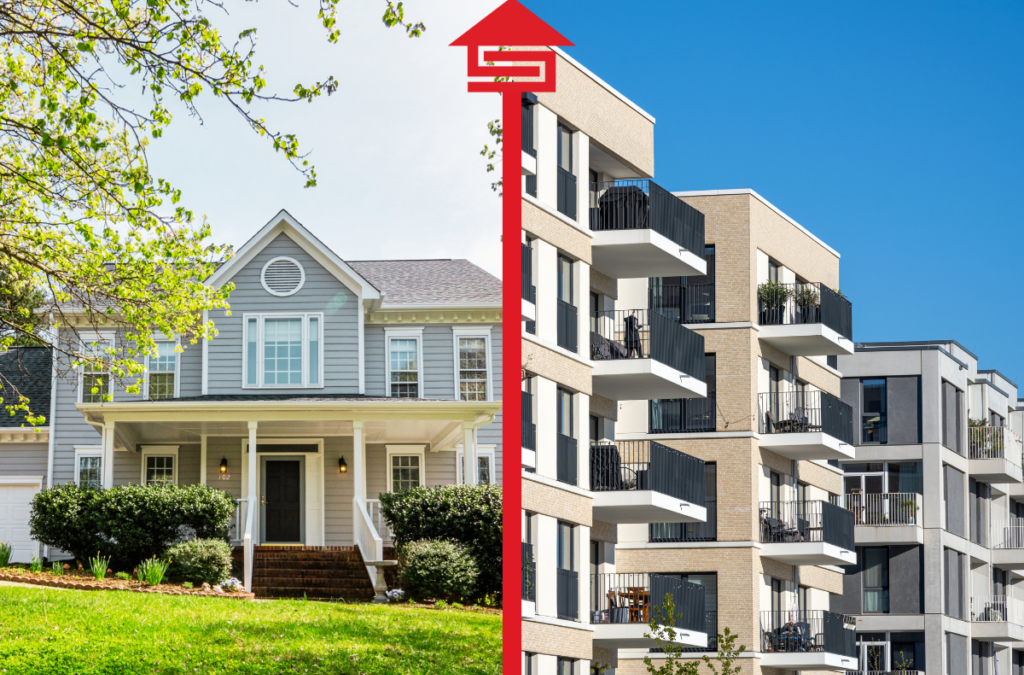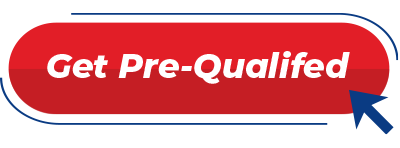
by First Integrity Team Supreme Lending | Mar 25, 2025
Discover the Key Differences Between a Condo vs. Single-Family Home
So you’ve finally decided to end the debate of renting vs. owning a home and pull the trigger on your homebuying journey. Congratulations! The next big question is deciding what kind of property you want to purchase—a condo vs. single-family home. Both options offer the potential to build equity, but the right choice comes down to your lifestyle, budget, and long-term goals.
To help you decide, here’s an overview the pros and cons of each option and how Supreme Lending may help you finance your dream home, whether it’s a condo or a single-family house.
Pros & Cons of Buying a Condo
Pros
- Lower Maintenance. One of the biggest benefits of condo living is that most exterior maintenance and landscaping are handled for you by the Homeowners Association (HOA). If you’re looking for a lower-maintenance lifestyle where you can focus on enjoying your space without the hassle of yard work or home repairs, you may want to consider a condo.
- Amenities. Many condo communities offer shared amenities such as pools, gyms, and clubhouses. This can provide luxurious perks without the extra cost of maintaining the amenities yourself.
- Affordability. In general, condos may be more affordable than single-family homes. For this reason, they are a great option for first-time homebuyers or those looking to downsize. If you’re trying to buy in a competitive housing market, a condo may offer a more budget-friendly option to open the door to homeownership.
- Location. Condos are often located in urban areas or desirable neighborhoods with easy access to dining, shopping, and public transportation. If you enjoy the vibrancy and convenience of city living, a condo can put you right in the action.
Cons
- HOA Fees. While HOAs manage the maintenance of shared spaces and amenities, that comes with a monthly cost. These fees can add up, and it’s important to factor them into your budget when considering the overall homebuying costs.
- Limited Privacy. Since condos are often in multi-unit buildings, you’ll likely be sharing a wall with neighbors. If privacy and quiet are important to you, this is something to consider.
- HOA Restrictions. HOAs typically have rules regarding what you can and cannot do with your unit, from the color of your front door to controlling whether you can rent it out. While these rules are put in place to help maintain the property’s value, they may also limit your freedom.
Pros & Cons of Buying a Single-Family Home
Pros
- More Space. Single-family homes typically offer more living space, both indoors and out. If you need room for a growing family, pets, or hobbies, or simply enjoy having a larger yard, a house may give you the space and flexibility you need.
- Privacy. Unlike condos, single-family homes can provide more privacy since you wouldn’t be sharing a wall with your neighbors. If peace and quiet are priorities, a standalone house may be your answer.
- Freedom to Personalize. As a single-family homeowner without an HOA, you have the freedom to make changes and renovations to your home. Want to build a deck, repaint your exterior, or add on more square footage? You would have the flexibility to do so.
- Suburban and Rural Living. Many single-family homes are located in suburban or rural areas. This may offer a quieter, more relaxed lifestyle away from the hustle and bustle of city life.
Cons
- Maintenance Responsibilities. With the freedom of owning a standalone property comes the responsibility for home maintenance, repairs, and upkeep. From mowing the lawn to fixing a leaky roof, you’ll be responsible for keeping everything in good condition.
- Higher Cost. Oftentimes, single-family homes may be more expensive than condos, both in terms of purchase price and ongoing costs such as property taxes, insurance, and utilities. Be sure to keep those additional costs in mind when deciding to buy a condo vs. a single-family home.
- Location. While one of the perks of single-family living is being in a more suburban or rural area, that also means you may be father away from city centers. This could result in a longer commute or less access to urban amenities.
How Do You Decide?
When choosing between a condo vs. a house, here are four helpful considerations:
- Lifestyle. Do you prefer a low-maintenance, lock-and-leave lifestyle with shared amenities? Or do you value privacy and space to personalize your property? You daily routine and personal preferences should guide your decision.
- Budget. While condos may have lower upfront costs, you’ll need to factor in HOA fees. On the other hand, single-family homes may require more financial investment in terms of ongoing maintenance.
- Location, Location, Location. Think about where you want to live. Do you prefer the convenience of urban life? Or do you dream of a suburban or rural retreat? The location has a direct impact on your lifestyle and commuting needs.
- Long-Term Goals. If you’re planning to grow your family, need extra space for hobbies, or want the freedom to make home improvements, a single-family property may make more sense. But if convenience and lower maintenance are calling your name, a condo may be the right fit.
The Benefits of Homeownership – No Matter What You Choose
Whether you opt for a condo or a standalone home, you’ll still enjoy all that homeownership has to offer. Owning your own place may give you the potential to build equity and financial stability. You’ll also have the flexibility to create a space that truly reflects your personality and lifestyle. Plus, homeownership has the potential to provide long-term rewards, as your property may appreciate in value over time.
Supreme Lending Has You Covered
Ranked as a 2024 top 15 retail lender in the country by Scotsman Guide, Supreme Lending has a wide range of mortgage options to help put people into homes—whether it’s a condo or single-family. Whatever your dream of homeownership may look like, we’re here to help with your home financing needs.
Ready to get started? Reach out to our team today!
Related Articles:

by First Integrity Team Supreme Lending | Mar 20, 2025
Deciding between renting vs. owning a home may be one of the biggest debates when it comes to housing. Both options offer unique advantages, but the key is to find which fits your personal goals and lifestyle. Let’s explore the pros and cons of each option and take a deep dive into the many potential benefits of homeownership and mortgage options that renters may not realize.
Pros and Cons of Renting
Renting offers flexibility and lower upfront costs, making it an appealing option for many. Here are some of the possible benefits and drawbacks of renting.
Pros of Renting
- Renting allows you to move more easily, ideal for those who frequently relocate or prefer not to be tied down to one area.
- Less Responsibility. When renting, your landlord or property management company is typically responsible for maintenance, repairs, and property upkeep. This saves you the headache of managing those tasks and additional costs.
- Lower Upfront Costs. When moving into a new rental, security deposits and first month’s rent are typically more affordable than a down payment for a home and other homebuying costs.
Cons of Renting
- No Home Equity. Making rent payments doesn’t build equity—unlike the potential for a home. No equity means you can’t take advantage of opportunities like cashing out on equity with a refinance.*
- Limited Personalization. Rental properties often have restrictions on renovations or even simple changes like painting walls and installing new fixtures.
- Rising Rents. Unlike a fixed mortgage, rent payments can oftentimes increase every year, sometimes significantly depending on your local market conditions.
Benefits of Owning
While renting may offer short-term convenience, owning a home comes with several potential long-term benefits that renting can’t match. Beyond simply having a place to live, explore these rewards of homeownership:
- Potential to Build Equity. Home values may appreciate over time. Unlike renting, homeownership may allow you to build equity as a future investment.
- Stable Payments. With fixed-rate mortgages, you have the confidence and peace of mind that your monthly payments will remain the same throughout the life of the loan.
- When you own your home, you have the creative freedom to really make it your own. You can make as many home renovations as you want to fit your unique style.
- Possible Tax Benefits. Homebuyers may qualify for potential tax deductions. Work with your tax advisor to learn more and see if owning a home could save you tax dollars.
- Pride of Ownership. There’s a unique sense of accomplishment and pride that comes with owning a home, allowing you to put down roots in a community.
Renting vs. Buying: Seven Key Questions to Consider
- How long do you plan to stay in one place? If you’re planning to stay in one location for several years, buying may be a smarter option.
- What’s your financial situation? Do you have enough savings for a down payment and closing costs? Evaluate your finances and get pre-qualified to determine your options.
- Are you ready for the responsibilities of homeownership? Owning a home comes with additional responsibilities than renting such as on-going maintenance, repairs, and upkeep.
- What’s your credit score? Your credit score plays a significant role in qualifying for a mortgage and getting favorable loan terms.
- What are the housing market trends in your desired area? Depending on your local area, it may make more sense to rent if housing prices are too high or out of your budget.
- Do you value flexibility or stability more? Consider your current lifestyle preferences. If you’re not ready to settle down, renting may offer the flexibility you need. However, if you’re drawn to a more stable living situation, homeownership may be the better option.
- What are your long-term goals? How could homeownership fit in with your broader financial and lifestyle goals, such as the potential to building equity, undergoing home renovations, investing in real estate, or creating a family home.
Down Payment Assistance & First-time Homebuyers
Don’t forgot to explore down payment assistance and first-time homebuyer programs that may help open the door to homeownership sooner than you think! FHA loans offer several benefits for first-time buyers, including lower down payment and credit requirements. While Conventional loans may only require as low as 3% down for qualified first-time buyers.
Ready to Stop Paying Your Landlord’s Mortgage?
Deciding between renting vs. owning a home is a big decision that depends on several factors such as your mortgage qualification, long-term plans, and personal preferences. While renting offers flexibility, homeownership may offer long-lasting benefits.
Ready to explore your homebuying options? Contact our team at Supreme Lending to discuss how to make your mortgage work for you!
*By refinancing an existing loan, total finance charges may be higher over the life of the loan.

by First Integrity Team Supreme Lending | Mar 10, 2025
Buying a home is an exciting milestone, but it may also come with unfamiliar terms and processes that feel overwhelming. One term you’ll likely encounter is “escrow.” If you’re unsure what escrow means or why it’s important during home loan transactions, you’re not alone—and that’s completely okay! At Supreme Lending, we’re here to make sure every step of your journey feels approachable and empowering. Our goal is to help you move forward with confidence and clarity. Understanding escrow during home loan transactions is crucial to feeling informed and secure throughout the process. Let’s take a closer look at escrow and why it’s such an important part of your homebuying experience.
What Is Escrow?
Escrow is essentially a secure trust account managed by a neutral third party. This account holds money, documents, or other assets on behalf of the buyer and seller during a transaction. The purpose of escrow is to ensure that all conditions of the agreement are met before funds and documents are transferred to their rightful owners.
How Escrow Works in Home Loan Transactions
Escrow plays a vital role in both the home-buying process and ongoing homeownership. Here’s how it functions at different stages:
- For Brokers: When purchasing a home, buyers typically deposit earnest money into an escrow account. This account securely holds the funds until the transaction closes, providing protection for both the buyer and seller.
- For Lenders: After the purchase, escrow continues to be essential. Many lenders set up an escrow account to manage recurring payments for property taxes and homeowners insurance. This ensures these important bills are paid on time, preventing coverage lapses or late fees.
Why Is Escrow So Important?
Escrow adds security and simplifies a process that may otherwise feel overwhelming. Here’s why it’s a cornerstone of homeownership:
- Protects Buyers and Sellers: Escrow ensures no funds or documents change hands until all conditions of the sale are fully met.
- Streamlines Payments: For homeowners, escrow simplifies life by automatically managing property taxes and insurance, making budgeting easier.
- Ensures Transparency: A neutral third party oversees the process, promoting fairness and clarity for everyone involved.




